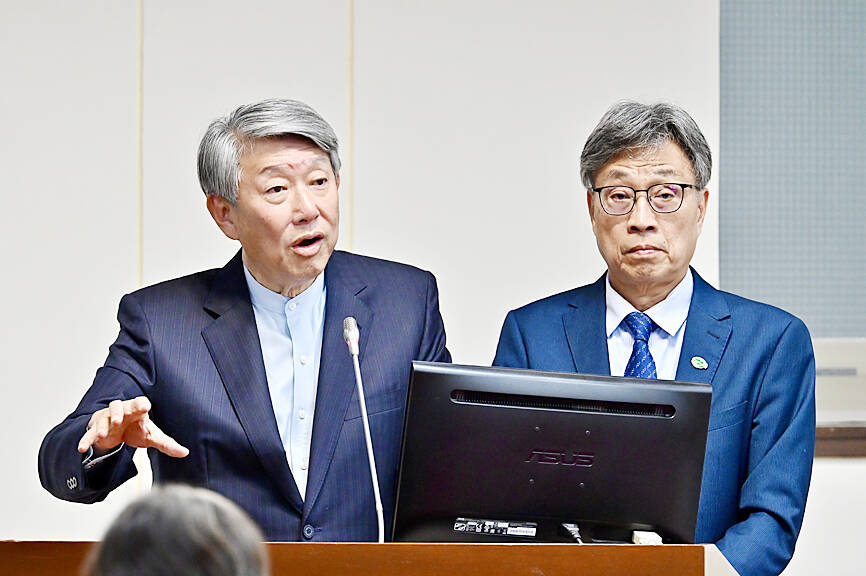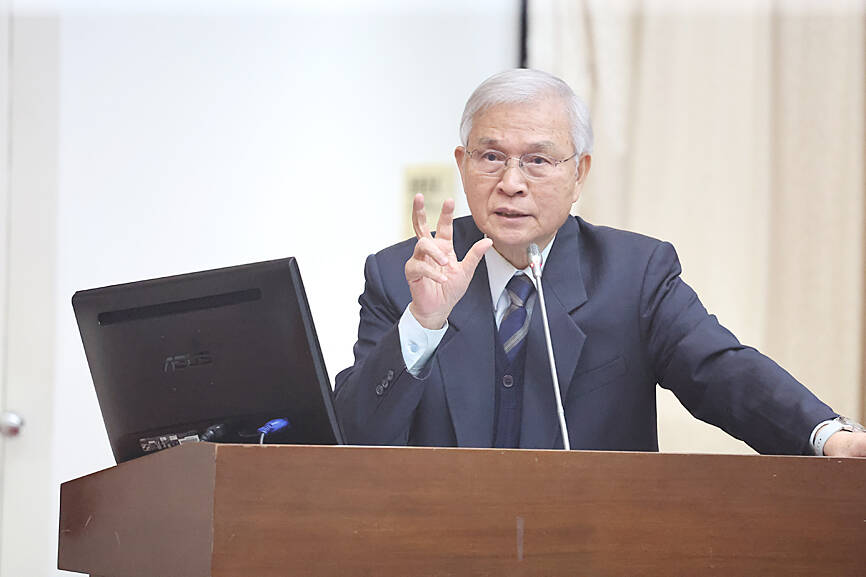Minister of Economic Affairs J.W. Kuo (郭智輝) yesterday outlined five measures to tackle rules of origin circumvention, which he said is one of four key areas in Taiwan-US tariff negotiations.
The measures are stronger monitoring of goods from China, communicating with Taiwanese businesses, establishing a blacklist of violators, imposing stricter penalties and applying anti-dumping tools, Kuo said at a meeting of the legislature’s Economics Committee in Taipei.
Stricter monitoring would target goods redirected to Taiwan and those rerouted through Taiwan to the US, Kuo said.

Photo: George Tsorng, Taipei Times
It is intended to prevent trade activities that could “affect the US’ judgement of Taiwan,” he added.
“Origin laundering” refers to the deceptive practice of companies misrepresenting a product’s country of origin to make it appear as though it was manufactured somewhere else, often to avoid tariffs or trade restrictions.
The minister made the comments along with Minister of Agriculture Chen Junne-jih (陳駿季) and Deputy Minister of Finance Lee Ching-hua (李慶華) as the government aims to address how Taiwan plans to sustain competitiveness in its agriculture, aquaculture, livestock and critical manufacturing sectors in the wake of US President Donald Trump’s “reciprocal” tariff policy.

Photo: CNA
Asked by Democratic Progressive Party Legislator Lai Jui-lung (賴瑞隆) whether the government was adequately prepared to weather economic turbulence triggered by Trump’s new tariff policy, Kuo said that as many exporters to the US face a uniform 10 percent tariff rate, Taiwan remains “highly competitive” due to its industrial strengths.
Taiwan and the US maintain “mostly complementary” trade in technology and other sectors, he added.
As the Presidential Office and the Cabinet started consultations with industry groups yesterday afternoon, Kuo said the government would continue listening to the private sector to identify areas for improvement.
At a separate meeting of the legislature’s Finance Committee yesterday, central bank Governor Yang Chin-long (楊金龍) said that uncertainty surrounding US tariffs remained, despite Trump’s decision overnight to pause planned tariffs on goods from more than 75 countries for 90 days, excluding China.
Apart from the great uncertainty for the stock market, a trade war and the hefty tariffs imposed by the US and China on each other is also not good for the global economy, Yang said.
“The only way for Taiwan to deal with this uncertainty is negotiation,” cable TV station USTV quoted Yang as saying.
Replying to a question raised by Chinese Nationalist Party (KMT) Legislator Lin Te-fu (林德福) whether there is room for upward revisions to the nation’s consumer price index (CPI) and core CPI this year, Yang said the central bank still believes consumer prices would remain stable in the face of a potential tariff hit.
It is too early to judge whether the local stock market is about to enter a bear market following days of turmoil caused by Trump’s tariff policy, Yang said, adding that the market’s long-term outlook would reflect the fundamentals.
The central bank would assess whether to increase Taiwan’s holdings of US Treasury bonds in its foreign exchange reserves, Yang said.
“At present more than 80 percent is ideal,” he said.
Additional reporting by Chen Cheng-hui

NEW IDENTITY: Known for its software, India has expanded into hardware, with its semiconductor industry growing from US$38bn in 2023 to US$45bn to US$50bn India on Saturday inaugurated its first semiconductor assembly and test facility, a milestone in the government’s push to reduce dependence on foreign chipmakers and stake a claim in a sector dominated by China. Indian Prime Minister Narendra Modi opened US firm Micron Technology Inc’s semiconductor assembly, test and packaging unit in his home state of Gujarat, hailing the “dawn of a new era” for India’s technology ambitions. “When young Indians look back in the future, they will see this decade as the turning point in our tech future,” Modi told the event, which was broadcast on his YouTube channel. The plant would convert

‘SEISMIC SHIFT’: The researcher forecast there would be about 1.1 billion mobile shipments this year, down from 1.26 billion the prior year and erasing years of gains The global smartphone market is expected to contract 12.9 percent this year due to the unprecedented memorychip shortage, marking “a crisis like no other,” researcher International Data Corp (IDC) said. The new forecast, a dramatic revision down from earlier estimates, gives the latest accounting of the ongoing memory crunch that is affecting every corner of the electronics industry. The demand for advanced memory to power artificial intelligence (AI) tasks has drained global supply until well into next year and jeopardizes the business model of many smartphone makers. IDC forecast about 1.1 billion mobile shipments this year, down from 1.26 billion the prior

People stand in a Pokemon store in Tokyo on Thursday. One of the world highest-grossing franchises is celebrated its 30th anniversary yesterday.

Zimbabwe’s ban on raw lithium exports is forcing Chinese miners to rethink their strategy, speeding up plans to process the metal locally instead of shipping it to China’s vast rechargeable battery industry. The country is Africa’s largest lithium producer and has one of the world’s largest reserves, according to the US Geological Survey (USGS). Zimbabwe already banned the export of lithium ore in 2022 and last year announced it would halt exports of lithium concentrates from January next year. However, on Wednesday it imposed the ban with immediate effect, leaving unclear what the lithium mining sector would do in the